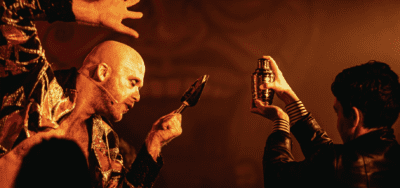Scott Thompson and Paul Bellini are coming out—again
The duo dishes on Kids in the Hall, which is enjoying a comeback, and their punk band Mouth Congress—which never really came
Known for their work as part of the legendary comedy troupe The Kids in the Hall, Scott Thompson and Paul Bellini began their careers as a gay electro-punk band called Mouth Congress—named for the Kama Sutra’s term for oral sex.
Mouth Congress formed in 1984 and were active for nine years. They recorded over 600 songs that didn’t see the light of day until 2021.
Brooklyn label Captured Tracks released the band’s three-song single “Ahhhh the Pollution” for Record Store Day, followed by “Waiting for Henry,” a 29-song compilation of their best songs, restored and available for the first time.
Young, frustrated and terrified to be young gay men at the height of the AIDS era, the duo each channeled their sexuality into delightfully crude lyrics about race, gender, fucking and general nonsense.
Thompson told Brooklyn Magazine the band didn’t take off because it was impossible to be out of the closet in the 80s. That both members were unabashedly gay, and that The Kids in the Hall were skyrocketing to fame, Mouth Congress was put on the backburner.
The world finally caught up to Mouth Congress, and to celebrate, Thursday the duo appear in person at C’mon Everybody at 5:30 p.m. for a free screening of their other new project, a sort-of-documentary about the band, also called “Mouth Congress.”
The “documentary” combines archive footage by Bellini in the 1980s, footage of their 2016 reunion show, thread together by a made-up mythology of the band, performed by Kids in the Hall actor Kevin McDonald.
“We decided from the very beginning, we were not going to let the truth get in the way of an entertaining documentary,” says Scott Thompson. “It was more important to make something entertaining that would burnish our legend.”
Brooklyn Magazine spoke with Scottt Thompson and Paul Bellini about relaunching Mouth Congress and Amazon’s new season of The Kids in the Hall and performing at 60. And yes, Paul Bellini let us touch him.
Why is ‘Mouth Congress‘ screening at the scandalous hour of 5:30 p.m. on Thursday?
Scott Thompson: It’s the early bird special! We need to have our supper early. But really, it all happened at the last minute. Bill Coleman, who’s a producer and manager, he’s a tastemaker and a scene maker. He knows everybody, so we asked him if he would try to get us into a venue, and he got us booked at C’mon Everybody at the last moment. We hear it’s a very cool club.
Paul, may I touch you?
Paul Bellini: You’re always allowed to touch me. Fans have that license. It’s kind of understood that if you know who I am, then yeah, you’re allowed to touch.
Thompson: Paul has less physical boundaries than a porn star.
Paul, will you talk about the genesis of you wearing a towel on The Kids in the Hall and how it became a staple of the show? It grew into a whole fandom.
Bellini: The towel thing was a contest that we did back in the second year of the show in 1990. The Kids didn’t want to do an ordinary contest where you get to meet The Kids and have dinner with them. They wanted a unique prize, and the weirdest thing we could think of is me in a towel. Somehow it worked. We did four iterations of the contest, two American and two Canadian ones over a span of four years. It always seemed to work for the fans, I guess they they got the joke.
Thompson: It was Mark McKinney’s idea. I think Mark was, in a subtle way, kind of making fun of Paul and I telling our bathhouse stories.
The Mouth Congress documentary uses archive footage of the band from the 1980s and it has stories you made up, so I don’t know how to describe it.
Thompson: We don’t either.
Bellini: It only has about 30 percent of the truth.
Thompson: We knew that no one really knew who Mouth Congress were. We couldn’t play with anybody’s memories of us because nobody had memories. We never released the record. So we decided to craft a story, which is inspired by reality. It was an exercise in mythmaking, in a way. Paul had all this footage for years and years because he documented the entire scene from day one with his video camera. We just had a feeling that people would be really thrilled by seeing this very early video documentation, from those days, because Paul was very shrewd in that he documented everything: The Kids in the Hall, our friendship groups, Mouth Congress, it’s all there.
Bellini: I was the annoying guy with a camera.
Why didn’t you release any of your 600+ recorded songs in the 80s?
Bellini: I didn’t know how to release a song. We sent some demo tapes to a few record companies who turned us down. Kids in the Hall wasn’t that famous then and we weren’t in a position to tour. So most record companies weren’t that interested or thought, “why are the lyrics so offensive?” so the music just sat there. As for 600 songs, we’ve released 33 good ones, and there’s probably another 100 or so that are really good.
Thompson: We wrote a lot of bad songs. What happened was the Kids in the Hall took off, and that was the rocket, so that’s the one we clambered aboard. For me, personally, there was just no way that you could be an openly gay rock star in the 80s. That just wasn’t possible. People say, “What about Boy George and Elton John?” They weren’t openly gay. Nobody was. No matter how good we were, or how good we could have gotten, there was no chance. I knew for myself that the only way was the Kids in the Hall, where I could bury myself in the company of four other guys and I could create characters and wait out the storm. It was like a war that went on for quite a long time. But I knew eventually, there would have to be a truce called, and eventually, maybe even peace. But that was wartime. So we had to abide by the rules of war.
Bellini: When we started Mouth Congress in November 1984, AIDS was just starting. It was even before Rock Hudson announced his positive status. Think of how much has changed in those 37 years. In terms of AIDS no longer being a death sentence, because it was for about 12 years. Gay is now kind of mainstream, and no one gives a fuck one way or the other. Socially, the world has progressed so much that it caught up to us. Finally, yeah. Now we’re in a position to do our work.
How did being young and gay at the height of the AIDS epidemic shape your music and your comedy?
Thompson: We wrote hundreds of songs because what else were we’re gonna do? We were young, man, we should have been fucking, but we weren’t really allowed to fuck like we wanted to. So it was best to translate it. For myself, the sexual drive is quite often the engine of creativity. I think that’s why you’ll find the songs so sexual. Because we’re really fucking the audience. Or letting them fuck us. It was really just that art saved our lives.
Bellini: Friends of ours were dying. That doesn’t make sense when you’re young. It’s one thing to lose somebody in a car accident, but we know guys who checked into the hospital with pneumonia and never came out. The degree of shock is something that I don’t think a lot of young people can appreciate that we’re war scarred. We’re war vets. Because there was no cure. There was no drug cocktail, there was only a contagious disease with a 100 percent death rate. And you got it from being gay and having sex. You can imagine the level of horror we had to deal with. You’re coming out, which is already bad enough, but the fact that you couldn’t even act on it? We had to suppress so much natural instinct, and Scott’s right. Our solution was to be creative, to make comedy, to make music, to make films. It was all we could do.
Thompson: I have to really emphasize: young gay people, young queer people have no idea how bad it was. Maybe it’s not conscious, but there has been a movement within the community to kind of bury the past. I think it’s just too difficult to accept. Society can’t accept what they did and I think gay people are almost embarrassed by it. I think that the movement has become so consumed by gender, that sexuality is being kind of ignored. Paul and I were witnesses. So I’m going to be a problematic thorn in society’s side for the rest of my life, because I cannot let this time be forgotten.
Is being in your 60s an added challenge to relaunching Kids in the Hall and Mouth Congress?
Thompson: Oh, there’s a lot of challenges. This is a very tricky world. This is a world that is just poised to be outraged at every moment. For people like us, who are punks at heart, that’s a difficult thing to deal with. Because, ultimately, it’s just art, right? We’re not activists, activism is a sort of a side benefit. Art’s supposed to disturb and upset people and make you think. There is this thing that’s happening in culture today, where people are afraid of that a little bit. So it’s a little difficult for us to come back into this world, to be thrust back into the spotlight, when we really don’t have that fear. But it is definitely a difficult world to make art.
A lot of things are better for gay culture since AIDS stopped being a death sentence, but it seems like certain hallmarks of gay culture are over. The Buddy Cole skit in the new season of The Kids in the Hall is about gay hangouts closing for good.
Bellini: All of the sexual spaces are in jeopardy. Somebody was telling me a story the other day about one of the last remaining back rooms in Toronto. Two girls barged in and started talking, and there’s like guys giving head and jerking off next to them. One of the girls got touched inappropriately and complained to the management and the management said, “what were you doing in a back room?” He didn’t even know how to respond to the complaint because there’s signs posted, “This is a sexual area.” So when you hear those stories, you think, “fuck, is there anything left for us?” You go to a gay bar now and there’s like bachelorette parties. A lot of that I blame on drag queens because of “RuPaul’s Drag Race” fans. Now in our community, if there’s 10 bars, nine of them have drag shows because the only way they can survive is by drawing in “Drag Race” fans, but it’s crowding out the rest of us.
Thompson: I think there is a fear. I think the fear of gay male sexuality has actually been throughout society our entire lives. Because let’s face it, men on men sexuality is so hot and everybody knows it.
Bellini: Do you think it’s jealousy, Thompson?
Thompson: I do. I do, actually. And so people are so jealous of our sex lives, they just want to stop it. You hear stories of people kink shaming at pride. As the LGBTQ acronym expands, the people at the beginning of the acronym are being squashed a little. In an attempt to bring everybody in we might just dilute it so much that it doesn’t mean anything anymore. I’m trying to be very polite here!
Who’s your favorite Kids in the Hall cast member?
Thompson: Well, I know who Paul’s is.
Bellini: Say it.
Thompson: Dave [Foley]. And you know what? Paul never misses an opportunity to tell me or to remind me that all of his favorite pieces are Dave’s.
Bellini: I don’t feel right saying it’s you. I’m also in genuine awe of Dave Foley, I always was because he’s the sarcastic wit. And that’s the kind of comedy I always really loved as a child. But also, Dave Foley’s face is really interesting and in the new series, he does so much with that face, his performances, his acting in the new series, is really fascinating. And there’s so many pieces where that’s who I’m watching. I mean, don’t get me wrong, I love all five.. I’ve known all of you for over 35 years, but Dave does hold a special place for me.
Scott, are you allowed to say who your favorite is?
Thompson: No, I’m not allowed.
Why are so many Canadians so funny?
Thompson: Well, the short answer is that Canada is a country that’s not taken seriously by anyone. And that’s a good place for a funny person to start. If you’re not taken seriously, you have to develop your sense of humor. I think it’s living between two monsters, England and the U.S., Mommy and Daddy, and neither one really pays us too much attention. So we’re always trying to get the world’s attention, and one of the ways to do that when you don’t have power or money or fame is you have to be funny. It’s a quality that’s really lauded in Canadian culture. People really love a funny person here.
Younger gay people don’t seem to appreciate Scott’s character Buddy Cole, but your cast mate Bruce McCulloch said it was seeing your one man show as Buddy that made him want to do the Kids reboot. The other cast members say they get messages from fans saying Buddy saved their lives. So what are the negative qualities people see in Buddy?
Thompson: [Sighs] Buddy doesn’t virtue signal. He doesn’t he doesn’t fit into a classic leftist narrative. He goes back and forth all over the map. He takes every issue as an issue. He’s not a follower.
Bellini: He celebrates the dark side.
Thompson: He does, he’s not afraid of it. And he’s certainly not afraid of the darkness in our community. He’s always been the person that goes, “well, if you’re not going to look at it, then we’re never going to get any better.” So you have to look at it. He admits that when you’re a marginalized community like this, when you’ve been loathed and feared for so long, there are going to be dysfunctions that have to be addressed. That doesn’t mean that these people don’t deserve rights, but you have to address that there are problems. The only way to do that in my mind is through comedy.
You might also like 


























